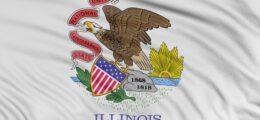Small Business Optimism Drops Below Index Average in December
Small Business Optimism Drops Below Index Average in December
January 12, 2021 Last Edit: March 4, 2025
Small Business Optimism Drops Below Index Average in December
WASHINGTON, D.C. (Jan. 12, 2021) – The NFIB Small Business Optimism Index declined 5.5 points in December to 95.9, falling below the average Index value since 1973 of 98. Nine of the 10 Index components declined and only one improved. Owners expecting better business conditions over the next six months declined 24 points to a net negative 16%.
“This month’s drop in small business optimism is historically very large, and most of the decline was due to the outlook of sales and business conditions in 2021,” said NFIB Chief Economist Bill Dunkelberg. “Small businesses are concerned about potential new economic policy in the new administration and the increased spread of COVID-19 that is causing renewed government-mandated business closures across the nation.”
Key findings include:
- The NFIB Uncertainty Index decreased 8 points to 82.
- The percent of owners thinking it’s a good time to expand decreased 4 points to 8%.
- Sales expectations over the next three months declined 14 points to a net negative 4%.
- Earnings trends over the past three months declined 7 points to a net negative 14% reporting higher earnings.
As reported in NFIB’s monthly jobs report, small business job growth continued in December but the gains remain uneven as certain sectors of the economy are slowing due to state-mandated business closures and consumer resistance to spend.
A net 21% (seasonally adjusted) of owners reported raising compensation and a net 14% plan to do so in the coming months.
Fifty-two percent of owners reported capital outlays in the last six months. Of those owners making expenditures, 38% reported spending on new equipment, 20% acquired vehicles, and 11% improved or expanded facilities. Five percent acquired new buildings or land for expansion and 8% spent on new fixtures and furniture. Twenty-two percent plan capital outlays in the next few months.
Seasonally adjusted, a net negative 2% of all owners reported higher nominal sales in the past three months, down 7 points from November. The net percent of owners expecting higher real sales volumes decreased 14 points to a net negative 4%.
The net percent of owners reporting inventory increases decreased 2 points to a net negative 6%. The net percent of owners viewing current inventory stocks as too low increased 2 points to 7%, a record high. A net 4% of owners plan inventory investment in the coming months, down 1 point from November but historically high.
The net percent of owners raising average selling prices decreased 2 points to a net 16% (seasonally adjusted). Price hikes were the most frequent in retail (30% higher, 6% lower) and wholesale (26% higher, 13% lower). A net 22% are planning price hikes (seasonally adjusted).
The frequency of reports of positive profit trends decreased 7 points to a net negative 14% reporting quarter on quarter profit improvement. Among owners reporting weaker profits, 55% blamed weak sales, 11% cited usual seasonal change, 6% cited a higher cost of materials, 6% cited labor costs, and 3% cited lower prices. For owners reporting higher profits, 69% credited sales volumes, 16% cited usual seasonal change, and 6% cited higher prices.
Three percent of owners reported that all their borrowing needs were not satisfied. Twenty-six percent reported all credit needs were met and 60% said they were not interested in a loan.
NFIB is a member-driven organization advocating on behalf of small and independent businesses nationwide.
Related Articles














